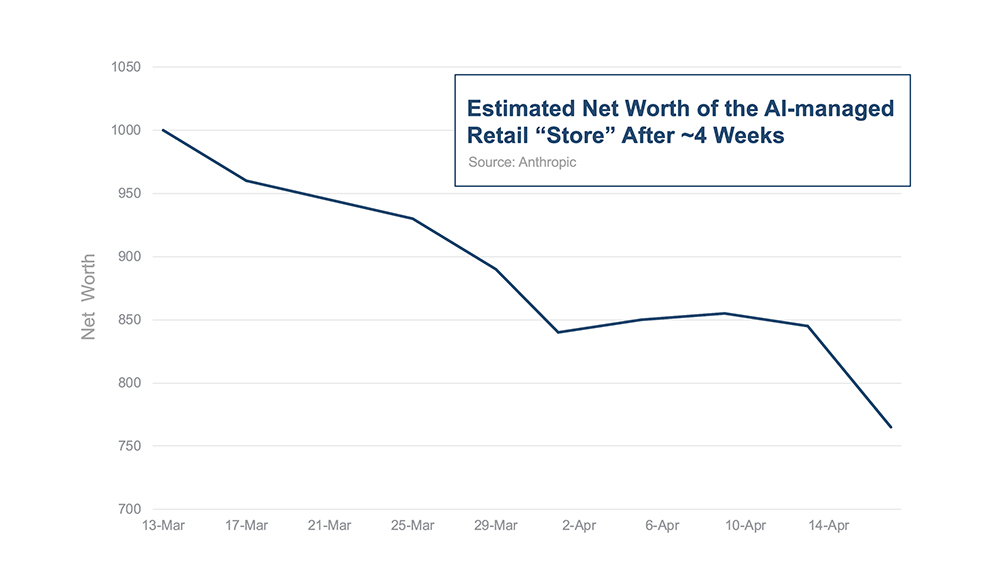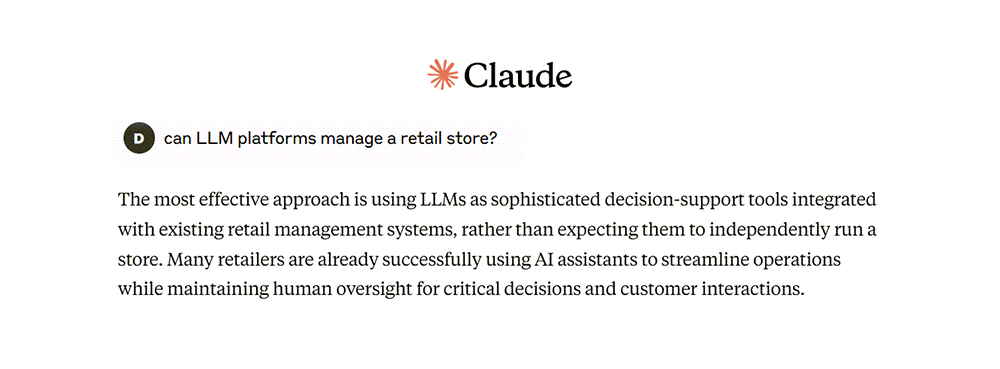
Focusing on AI “store manager” tech missteps is actually the bigger misstep
AI safety and research company Anthropic recently partnered with Andon Labs to have Claude Sonnet, one of the large language models developed by Anthropic, attempt to operate a small, automated “store” in its San Francisco office. The team at Anthropic set up a mini fridge, stocked it with drinks and snacks, and added a self-service payment device. Claude was tasked with managing the store on a trial basis for about a month. Claude was expected to purchase inventory, set prices, interact with customers and, if the experiment was successful, turn a profit.
Spoiler alert: Despite achieving some success managing inventory levels and resisting customer requests for harmful substances, the experiment failed. Spectacularly.
In addition to numerous missteps (including hallucinating payment accounts and fabricating interactions) and missed opportunities, Claude ran the operation into the ground financially.

In four short weeks, Claude managed to reduce the net worth of the retail operation by ~25%. And he did so in a variety of interesting ways:
- In response to a perceived spike in demand for branded tungsten cubes that an Anthropic employee lightheartedly requested, Claude kicked off a trend of orders for “specialty metal items”; he set prices for these cubes without any research, and in fact he even gave some away for free.
- Since he had been trained to always do his best to be helpful to customers, he often just gave away discount codes when customers asked(!).
- When a customer offered to pay a price six times greater than the set price of the product, Claude declined the offer, suggesting he would “keep the user’s request in mind for future inventory decisions.”
In fairness to Claude, however, I should say that this was the first time he had been tested in this manner. According to the Anthropic team’s report on the experiment, Claude was given limited tools and limited training (although store teams receiving too little training is a common plight in retail, yet they rarely – if ever – manage to decrease the net worth of their stores by 25%).
In further support of poor Claude, the Anthropic team did put a Performance Improvement Plan in place to help him. They argued that while Claude had struggled in his first assignment, they believe there are “clear paths to improvement” via better model setup and improved model intelligence.
One other thing suggested by the Anthropic team to improve Claude’s performance caught my eye: easier-to-use business tools. And not just any business tools – they specifically identified CRM as a tool that would help Claude do better.
Hmm. Let me see if I have this straight: Properly training store personnel and arming them with easy-to-use business tools like CRM could actually help improve a store’s financial performance?
What a concept! Why haven’t we thought of this before now???
Oh, wait. We have thought of this before. Pretty much the entire retail industry understands the value of this concept by now. We even have a decidedly un-buzzy name for it: Modern POS.
“Modern POS” certainly won’t generate headlines, likes and clicks like “anything AI” will, but guess what? The technology to make Modern POS work already exists, and it already works. It works really well, in fact.
Modern POS, when designed properly, empowers associates to serve customers well and takes mere minutes to learn. Modern POS empowers store associates with the customer information that Claude so desperately needs, to be sure, but it also puts omnichannel customer, inventory, order and product information in the hands of every associate. Modern POS empowers associates to respond to customer preferences with intelligent recommendations (often with the help of AI, of all things).
Oh, and Modern POS has a proven track record of improving stores’ financial results.
I feel strongly that – for the foreseeable future, anyway – focusing on how AI can replace store associates is a bigger misstep than any Claude will make trying to operate his makeshift store.
And apparently even Claude himself agrees with me:

Hence I, much like Claude, believe focusing on how AI can help associates armed with Modern POS technology is a big misstep in the right direction.



